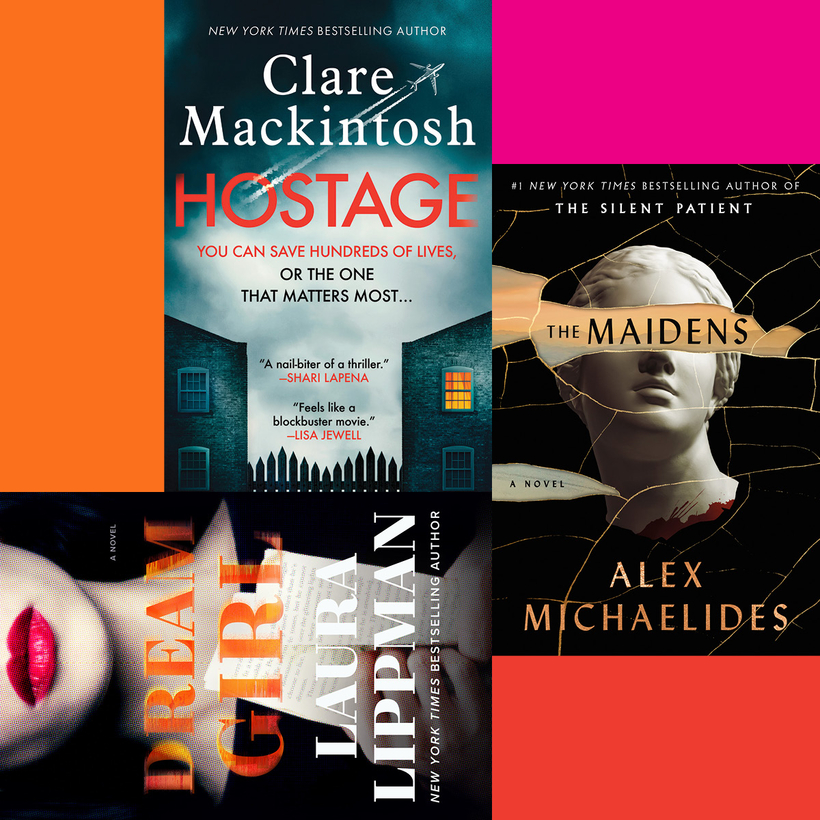As if rowdy passengers and coronavirus jitters weren’t bad enough, Hostage reminds us, in the scariest possible way, that worse things can happen on an airplane.
It begins routinely enough, with flight attendant Mina Holbrook switching schedules with a colleague in order to work the inaugural nonstop London-to-Sydney route for World Airways. Her home life is a bit stressful, and she needs a break. Midway through the flight, she receives a heart-stopping note: either she gives as-yet-unidentified hijackers access to the pilot’s cabin or accomplices back home will harm her daughter. In the hours remaining, Mina has to reconcile her desire to save her child with her responsibility to the 353 passengers onboard.
Hostage is a leap into full-on-thriller territory for British writer Clare Mackintosh, best known for her first-rate domestic-suspense novels. She succeeds by seamlessly combining the genres, moving between the action on the plane and the situation at Mina’s home. (Her adopted daughter has some challenging psychological disorders, which her husband is still learning how to deal with.) Back in the air, Mackintosh releases a steady trickle of information about the individual hijackers, gradually revealing the vulnerabilities and issues that have contributed to their radicalization.
The paradox of extremism is front and center here. How does passion for a cause, even a legitimate one, justify the sacrifice of innocent people? And, really, how is this good publicity?! Mackintosh has certainly given us a compelling array of reasons not to get on a plane, topped off with a chilling final twist. Hostage is one of the summer’s must-reads, but you’ll want to enjoy it with your tray table locked and your armchair in the full upright position, anchored firmly to the floor.
Those who avidly awaited the next book by Alex Michaelides after his best-selling 2019 debut, The Silent Patient, may find The Maidens something of a letdown. As in The Silent Patient, his protagonist is a therapist, this time a woman specializing in group work, which, as an introvert, she doesn’t seem suited for. Mariana Andros is still grieving the drowning death of her husband the year before, and leading a therapy group in London, when her adored niece summons her to Cambridge University, where the girl’s best friend has just been murdered.
The crisis re-invigorates Mariana, who vows to find the killer herself and zeroes in on a popular American professor, the leader of a coterie of mean girls known as the Maidens, who study Greek literature with him and like to dress all in white. The dead girl was a Maiden, so he’s a legitimate suspect, but Mariana focuses on the Byronic professor to the exclusion of several other perfectly viable potential murderers lurking around St. Christopher’s College.
This might be a good time to point out that Mariana’s detective skills are on a par with her therapeutic ones. Poirot she is not. Nor has grief sharpened her mind, so there’s a lot of digressing about Tennyson and the goddesses Demeter (life) and Persephone (death), also favorite study subjects of the Maidens. Though these references add a ping of erudition, they never achieve much resonance. The same is true of the Maidens themselves; we get little sense of them beyond their white gowns and unpleasantly elitist attitudes, so their fates leave the reader indifferent.
For some, Michaelides’s evocation of the college’s seductive yet sinister atmosphere will be deliciously, gothically bewitching, and reason enough to love The Maidens, but for others, a less blinkered heroine and more believable finale might have earned the book a first.
If you were to update Stephen King’s Misery by running it through a #MeToo lens grinder, it might give you an idea of what Laura Lippman is up to in Dream Girl. Several mystery writers have recently seized this moment to reflect fictionally on their profession, but Dream Girl probably gives the most complete tour of a writer’s mind.
This particular mind belongs to a 60-ish white man, the buttoned-down novelist Gerry Andersen, who has just moved back to Baltimore from New York. Due to a nasty accident involving a rowing machine and a vicious floating staircase in his sleek new penthouse, Andersen is confined to a hospital bed there, attended by an assistant and a nurse.
He spends most of his time ruminating—about his childhood with an adored mother and frequently absent father; his writing career, of which his Dream Girl is the highlight; the frustrations of academia; and the women in his life, including his three wives. But his thoughts, scrambled by painkillers, turn nightmarish when he starts receiving communiqués from a mysterious woman who claims to be the real-life dream girl—though he swears he made her up—and who has a few demands.
Andersen seems to be both Lippman’s alter ego and punching bag. A tail-end baby-boomer swamped by a tsunami of cultural change, he is alternately clueless and acutely aware, and too self-absorbed to notice what’s really going on around him. What transpires while he’s bedridden owes something to Misery, but his captor is not, like Annie Wilkes, his biggest fan. The characters do share certain skills however, which the author deploys to great comic-horror effect in this thought-provoking, slyly amusing novel. I could be dead wrong, but I bet Lippman had a cathartic blast writing it.
Lisa Henricksson reviews mystery books for Air Mail. She lives in New York City

